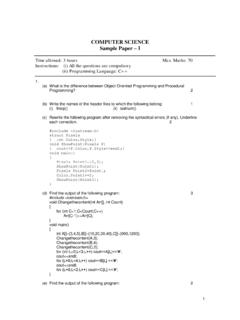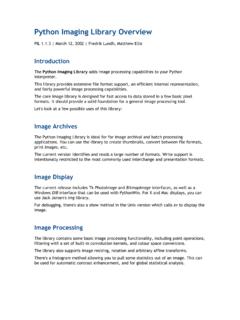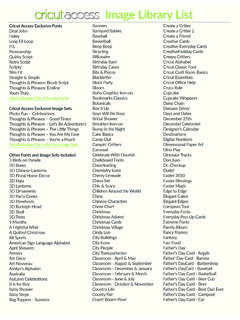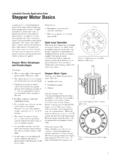Transcription of C++ Standard Library Function - CppforSchool
1 C++ Standard Library Function The C++ Standard Library provides a rich collection of functions for performing common mathematical calculations, string manipulations, character manipulations, input/output, error checking and many other useful operations. This makes the programmer's job easier, because these functions provide many of the capabilities programmers need. The C++ Standard Library functions are provided as part of the C++ programming environment. Header file names ending in .h are "old-style" header files that have been superseded by the C++ Standard Library header files. C++ Standard Library header file Explanation <iostream> Contains Function prototypes for the C++ Standard input and Standard output functions .
2 This header file replaces header file < >. <iomanip> Contains Function prototypes for stream manipulators that format streams of data. This header file replaces header file < >. <cmath> Contains Function prototypes for math Library functions . This header file replaces header file < >. <cstdlib> Contains Function prototypes for conversions of numbers to text, text to numbers, memory allocation, random numbers and various other utility functions . This header file replaces header file < >. <ctime> Contains Function prototypes and types for manipulating the time and date. This header file replaces header file < >. <cctype> Contains Function prototypes for functions that test characters for certain properties (such as whether the character is a digit or a punctuation), and Function prototypes for functions that can be used to convert lowercase letters to uppercase letters and vice versa.
3 This header file replaces header file < > <cstring> Contains Function prototypes for C-style string-processing functions . This header file replaces header file < >. <cstdio> Contains Function prototypes for the C-style Standard input/output Library functions and information used by them. This header file replaces header file < >. <fstream> Contains Function prototypes for functions that perform input from files on disk and output to files on disk. This header file replaces header file < >. <climits> Contains the integral size limits of the system. This header file replaces header file < >. <cassert> Contains macros for adding diagnostics that aid program debugging. This replaces header file < > from pre- Standard C++.
4 <cfloat> Contains the floating-point size limits of the system. This header file replaces header file < >. <string> Contains the definition of class string from the C++ Standard Library <vector>, <list>, <deque>, <queue>, <stack>, <map>, <set>, <bitset> These header files contain classes that implement the C++ Standard Library containers. Containers store data during a program's execution. <typeinfo> Contains classes for runtime type identification (determining data types at execution time). <exception>, <stdexcept> These header files contain classes that are used for exception handling. <memory> Contains classes and functions used by the C++ Standard Library to allocate memory to the C++ Standard Library containers.
5 <sstream> Contains Function prototypes for functions that perform input from strings in memory and output to strings in memory. <functional> Contains classes and functions used by C++ Standard Library algorithms. <iterator> Contains classes for accessing data in the C++ Standard Library containers. <algorithm> Contains functions for manipulating data in C++ Standard Library containers. <locale> Contains classes and functions normally used by stream processing to process data in the natural form for different languages ( , monetary formats, sorting strings, character presentation, etc.). <limits> Contains classes for defining the numerical data type limits on each computer platform.
6 <utility> Contains classes and functions that are used by many C++ Standard Library header files. Mathematical functions Some of the important mathematical functions in header file <cmath> are Function Meaning sin(x) Sine of an angle x (measured in radians) cos(x) Cosine of an angle x (measured in radians) tan(x) Tangent of an angle x (measured in radians) asin(x) Sin-1 (x) where x (measured in radians) acos(x) Cos-1 (x) where x (measured in radians) exp(x) Exponential Function of x (ex) log(x) logarithm of x log 10(x) Logarithm of number x to the base 10 sqrt(x) Square root of x pow(x, y) x raised to the power y abs(x) Absolute value of integer number x fabs(x) Absolute value of real number x Character functions All the character functions require <cctype> header file.
7 The following table lists the Function . Function Meaning isalpha(c) It returns True if C is an uppercase letter and False if c is lowercase. isdigit(c) It returns True if c is a digit (0 through 9) otherwise False. isalnum(c) It returns True if c is a digit from 0 through 9 or an alphabetic character (either uppercase or lowercase) otherwise False. islower(c) It returns True if C is a lowercase letter otherwise False. isupper(c) It returns True if C is an uppercase letter otherwise False. toupper(c) It converts c to uppercase letter. tolower(c) It converts c to lowercase letter.










